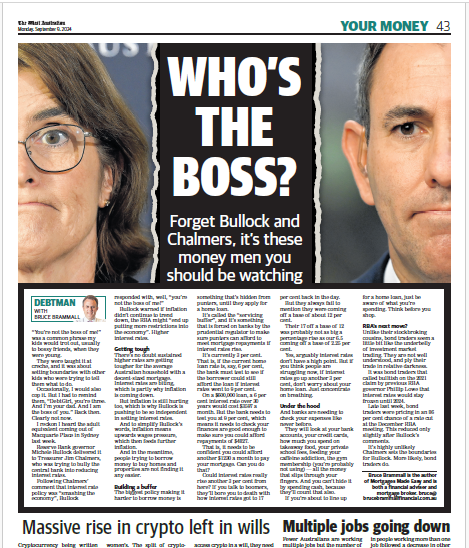
Bruce Brammall, The West Australian, 9 September 2024
“You’re not the boss of me!” was a common phrase my kids would trot out, usually to bossy friends, when they were young.
They were taught it at creche. And it was about setting boundaries with other kids who were trying to tell them what to do.
Occasionally, I would also cop it. But I had to remind them. “DebtGirl, you’re three. And I’m your Dad. And I am the boss of you.” Back then. Clearly not now.
Reckon I heard the adult equivalent coming out of Macquarie Place in Sydney last week.
RBA Governor Michele Bullock delivered it to Treasurer Jim Chalmers, who was trying to bully the central bank into reducing interest rates.
Following Chalmers comment that interest rate policy was “smashing the economy”, Bullock responded with, well, “you’re not the boss of me”.
Bullock warned that if inflation didn’t continue to trend down, the RBA might “end up putting more restrictions into the economy”. Higher interest rates.
Getting tough
There’s no doubt that sustained higher rates are getting tougher for the average Australian household, with a decent-sized mortgage. Interest rates are biting, which is partly why inflation is coming down.
But inflation is still hurting too, which is why Bullock is pushing to be so independent in setting interest rates.
And to simplify Bullock’s words: Inflation means upwards wages pressure, which then feeds further inflation.
And in the meantime, people trying to borrow money to buy homes and properties are not finding it any easier.
Building a buffer
The biggest policy making it harder to borrow money is something that’s hidden from punters, until they apply for a home loan.
It’s called the “servicing buffer”. And it’s something that is forced on banks by the prudential regulator to make sure punters can afford to meet mortgage repayments if interest rates rise.
It’s currently 3 per cent. That is, if the current home loan rate is, say, 6 per cent, the bank must test to see if the borrower could still afford the loan if interest rates went to 9 per cent.
On a $600,000 loan, a 6 per cent interest rate over 30 years would cost $3597 a month. But the bank needs to test you at 9 per cent, which means they need to check your finances enough to make sure you could afford repayments of $4827.
That is, they need to be confident that you could afford another $1230 a month to pay your mortgage. Can you do that?
Could interest rates really rise another 3 per cent from here? If you talk to Boomers, they’ll bore you to death with how interest rates got to 17 per cent back in the day.
But they always fail to mention that they were coming off a base of about 12 per cent.
Their 17 off a base of 12 was probably not as big a percentage rise as our 6.5 coming off a base of 2.25 per cent.
Yes, arguably interest rates don’t have a high point. But if you think people are struggling now, if interest rates went up another 3 per cent, don’t worry about your home loan. Just concentrate on breathing.
Under the hood
And banks are needing to check your expenses like never before.
They will look at your bank accounts, your credit cards, how much you spend on takeaway food, your private school fees, feeding your caffeine addiction, the gym membership (you’re probably not using), all the money that slips through your fingers. And you can’t hide it by spending cash, because they’ll count that also.
If you’re about to line up for a home loan, just be aware of what you’re spending. Think before you shop.
RBA’s next move?
Unlike their stockbroking cousins, bond traders seem a little bit like the underbelly of investment market trading. They are not well understood and ply their trade in relative darkness.
It was bond traders that called bulltish on the 2021 claim by the previous RBA governor, Phillip Lowe, that interest rates would stay frozen until 2024.
Late last week, bond traders were pricing in an 86 per cent chance of a rate cut at the December RBA meeting. This reduced only slightly after Bullock’s comments.
It’s highly unlikely that Jim Chalmers sets the boundaries for Michele Bullock. More likely, bond traders do.
Bruce Brammall is the author of Mortgages Made Easy and is both a financial adviser and mortgage broker. E: bruce@brucebrammallfinancial.com.au.
